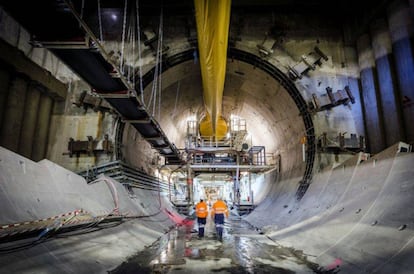Spain’s leading construction companies emerge from crisis
Figures suggest country’s six biggest players are on track for sustained growth

After more than seven lean years, Spain’s construction companies are beginning to show signs of recovery. In 2015, for the first time since 2007, the country’s six leading players saw an increase in overall revenue as well as market capitalization, according to the latest European Powers of Construction report (Epoc 2015) published by Deloitte.
Spain continues to occupy the second place in terms of total revenue, with six companies ranking between number two and 28 out of 50. Sales by the big six (ACS, Ferrovial, Acciona, FCC, OHL and Sacyr) were €64.9 billion, a 3% rise on 2014, while their collective capitalization rose to €32.6 billion, 6% up on the previous year. In 2014, revenue fell by 5% while capitalization rose 12%, in line with the performance of the Ibex 35 index of leading Spanish companies.
Contracts at home made up such a large part of companies’ portfolios that it will be difficult to recover pre-crisis levels through overseas contracts alone
Javier Parada, Deloitte
Overall, Spain’s construction companies underperformed in comparison to their European competitors, whose revenue rose on average by 5%, with a 21% increase in share value. This increase was largely due to British construction companies and the pound’s rise against the euro, but Spanish and Italian companies such as Ferrovial, OHL and Impreglio also performed well, notes Deloitte.
Ferrovial, which enjoyed a sales increase of 10% and a 27% rise in share capitalization, was the only company among the top ten to see double-digit growth in both areas.
France’s Vinci reported the biggest revenue increase, followed by Spain’s ACS and Bouygues, each reporting sales of more than €30 billion, which represents 35% of overall turnover among the 50 biggest players in the construction sector.
In general, the EU’s improved outlook has contributed to the increased share value of Europe’s biggest construction companies, led since 2012 by Vinci, Ferrovial and Bouygues.
Following the construction industry’s downturn in 2008, investment in the sector has grown steadily since 2014, a trend that is expected to continue throughout this year (2.4%), increasing in 2017 to 3.1%.
“Spain’s construction companies are recovering, and investment in basic infrastructure in developing countries is expected to increase, although contracts at home made up such a large part of companies’ portfolios that it will be difficult to recover pre-crisis levels through overseas contracts alone,” says Javier Parada, head of Deloitte’s infrastructure, construction and property division.
Sign up for our newsletter
EL PAÍS English Edition has launched a weekly newsletter. Sign up today to receive a selection of our best stories in your inbox every Saturday morning. For full details about how to subscribe, click here
The United Kingdom is the only EU country that has increased investment in construction over the last two years, in line with Japan and the United States. In 2014 and 2015, investment throughout the EU in construction grew on average by 1.6% and 2% respectively. In the coming years, says Deloitte, investment in construction will rise further, driven by increased household income, low mortgage rates, and a stabilizing housing market. In some countries, the company notes, demand for new housing will increase due to the arrival of growing numbers of refugees.
Deloitte also predicts that EU investment plans will see significant amounts of private and public capital pumped into a growing number of projects. The European Commission said earlier this year that construction investment in the EU will grow by 2.4% and 3.1% in 2016 and 2017 respectively.
English version by Nick Lyne.
Tu suscripción se está usando en otro dispositivo
¿Quieres añadir otro usuario a tu suscripción?
Si continúas leyendo en este dispositivo, no se podrá leer en el otro.
FlechaTu suscripción se está usando en otro dispositivo y solo puedes acceder a EL PAÍS desde un dispositivo a la vez.
Si quieres compartir tu cuenta, cambia tu suscripción a la modalidad Premium, así podrás añadir otro usuario. Cada uno accederá con su propia cuenta de email, lo que os permitirá personalizar vuestra experiencia en EL PAÍS.
¿Tienes una suscripción de empresa? Accede aquí para contratar más cuentas.
En el caso de no saber quién está usando tu cuenta, te recomendamos cambiar tu contraseña aquí.
Si decides continuar compartiendo tu cuenta, este mensaje se mostrará en tu dispositivo y en el de la otra persona que está usando tu cuenta de forma indefinida, afectando a tu experiencia de lectura. Puedes consultar aquí los términos y condiciones de la suscripción digital.









































